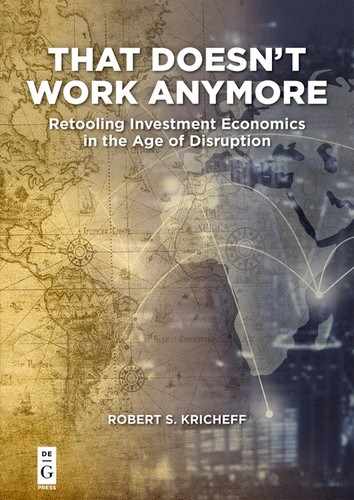Chapter 36
New Industries and What to Do about Them
Joseph Schumpeter was an economist who did most of his work during the first half of the twentieth century. He wrote extensively about innovation in the economy and is generally credited with coining the phrase creative destruction. In his construct of creative destruction, innovation and entrepreneurs disrupt, displace, and sometimes destroy existing industries, companies, and jobs, which causes upheaval. Like Mr. Keynes, Mr. Schumpeter’s ideas evolved over time and changed with more research and took into account events that were occurring in the world. He was a man of many ideas, and you may not want to accept all of them but just because you disagree with some of the concepts does not invalidate all of them. Much of his work culminated in his book Capitalism, Socialism and Democracy published in 1942. His work often features the entrepreneur as a hero in society. Some of his other views may seem a bit more radical today. He did not view creative destruction as the end of the process; in his thesis creative destruction would eventually cause the collapse of capitalism. He also, controversially, questioned the value of democracy. He was unsure whether most of the people understood what was best for the public good.103
There is no question that the twenty-first century has been ripe with the evolution of new industries and new businesses. The development of new industries raises questions about the economic, sociological, and political impact on existing companies and industries. All these developing industries present new and challenging potential investments. When analyzing the opportunities in new innovative investments categorizing the business by their approach and their reason for existing can be helpful:
a)Is the industry bringing a new innovative product?
b)Is it developing a new production methodology? Does this include use of new raw material or new methodologies?
c)Is it opening a new market, such as giving access to more people for an existing product?
d)Is it a new industry structure, such as some of the new peer-to-peer offerings?
e)Is it truly a new product or replicating an existing one?
f)Is it solving a problem with a process or an invention?
g)Is it competing on quality (i.e., product, service, access) or price?
h)Is it gaining an advantage by specialization or broadening the customers’ choice?
If you invest in early stage companies some of these themes may appeal to you more than others and you may favor innovators with certain traits. At the same time incumbents may be in a stronger position to fend off certain types of approaches from new entrants than others. With all this change, strategies can be developed that focus on rotating industries based on where you believe they are in the cycle of transformation and similar rotational strategies can be undertaken by geography as different economies are in different phases.
Innovation and new industries can take market share from existing companies and even push them out of existence. Operators in the existing businesses will not just roll over, but will fight back. Existing companies must be willing to invest and stay on the right side of technology to survive. The cynic has to question if the innovative business idea is just a great idea or an idea for a great business. If it is the former, the incumbents can often just usurp it. As an investor you can look for validations on a new industry. Two common validations for a new business come from customers and capital. If a new business or industry can attract and retain one or the other, it is often a strong validation of the business.
You will also want to analyze the ability of a new industry to keep its advantage. Today barriers to entry are weak and capital can flow quickly to competitors. One barrier that seems to lend itself to technology companies is switching costs. Switching costs can be actual cash expenses, annoyance, or risk of business interruption. As a retention tool, companies try to raise the switching costs for customers in different ways and one is to cross-sell them multiple services. In technology, embedded multiple offerings of complex services, the risk of downtime and malfunctions as well as loss of customer data and the effort of having to learn new systems can create a meaningful barrier from losing customers.
Israel Kirzner, a professor at New York University, for many years has written extensively on entrepreneurship, its importance, and impact. One of his themes is that entrepreneurship is often ignored in economic theories that focus on equilibrium. Economies do not stay in equilibrium as they are dynamic. He pointed out that new businesses and new industries are vital to competition and successful capitalism.104 The destruction, disruption, and draw on capital that new industries create have impacts throughout the economy. On a macro basis these factors can initially hurt the economic environment through job disruption and changes in the status quo, but generally lead to long-term growth and improved employment and quality of life.
Analyzing new industry developments is difficult because of how subjective the process is. There is often no data on the new industry. You can examine the opportunity set and the strengths and weaknesses of existing operators. You can conduct surveys and game theory to analyze possible outcomes, but there is no certainty. Investors in start-ups are often very industry focused as understanding the entire economic sphere around a new industry can be very valuable in making investment decisions but it still does not guarantee success. The level of subjectivity, uncertainty, and unknowns in the analysis is what can make an investment in new industries so exciting.
